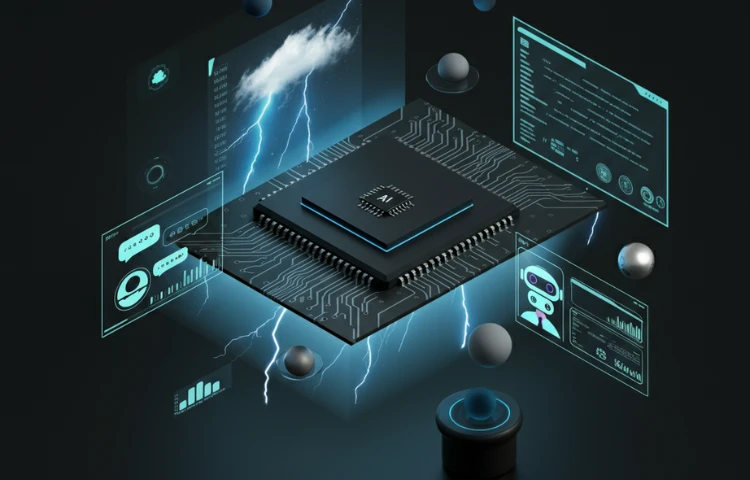Artificial intelligence (AI) has moved beyond science fiction and is now at the heart of business, technology, and innovation. Thanks to advances in machine learning, natural language processing, and computer vision, AI is changing the world faster than expected. Understanding the key developments in AI can help individuals, professionals, and businesses stay ahead in this technology-driven world.
AI-Powered Automation Is Redefining the Workforce
Automation of complex tasks is one of AI’s most transformative capabilities. This goes beyond repetitive automation. AI can analyze data, make decisions, and learn from experience. AI is automating tasks in manufacturing, logistics, and finance. This has led to concerns about job losses, but it has also created new tasks that require advanced skills, fueling workforce growth.
Natural Language Processing Is Making Machines Conversational
Natural language processing (NLP) has significantly accelerated the development of AI. This technology helps machines understand, interpret, and generate human language. Chatbots, virtual assistants, and AI writing software can now mimic human responses. Natural language processing (NLP) is being used in customer service, education, content development, and mental health. Being able to speak to AI in plain language makes technology more accessible to everyone.
Generative AI Creates Unprecedented Content
Machines can now create text, images, music, and videos using generative AI. Tools like DALL·E, Midjourney, and GPT-based models can generate innovative and realistic results from basic inputs. This trend is transforming marketing, design, gaming, and entertainment. Artists and businesses are using generative AI to enhance creativity, personalize experiences, and accelerate production. It also raises important questions about originality, ownership, and ethical use of generated content.
AI Improves Medical Diagnosis and Treatment
AI improves medical diagnosis, treatment planning, and drug development. Medical image analysis, abnormality detection, and disease risk prediction are delivering highly accurate results thanks to algorithms. AI tools help doctors make informed decisions and discover patterns that humans might miss. AI is making healthcare more efficient and personalized through remote patient monitoring and robotic surgery. As this trend continues to evolve, AI in healthcare will improve patient outcomes and support physicians.
AI Ethics and Responsible Use Are on the Rise
As AI becomes more powerful, ethical considerations are becoming more prominent. Developers, governments, and organizations are now concerned about algorithmic bias, data privacy, job losses, and AI abuse. Responsible AI requires transparent, fair, and accountable systems. Developing ethical and inclusive AI standards and legislation is becoming increasingly important. Companies are adopting ethical frameworks for AI to ensure that innovation does not harm society.
AI and Edge Computing Enable Real-Time Intelligence
AI and edge computing (i.e., processing data locally rather than in the cloud) are another major trend. This is helping with real-time decision-making applications, including self-driving cars, industrial automation, and smart cities. AI in edge devices such as cameras, sensors, and smartphones can accelerate system responses, making them faster, more private, and less bandwidth-intensive. 5G networks will improve the performance and coverage of edge AI.
AI in Education Transforms Learning
AI personalizes learning, making it more important in education. Smart classrooms provide personalized lessons and feedback. AI automates grading, identifies learning gaps, and helps students with special needs. AI assistants can help students adapt to virtual learning environments. This democratization of learning provides high-quality education and targeted support to diverse students, improving their learning performance.
Cybersecurity AI Strengthens Digital Defenses
The use of AI in cybersecurity is also growing. Traditional security systems sometimes lag behind cyber threats. AI can proactively detect anomalies, threats, and attacks in real time. Machine learning techniques can identify dangerous trends in massive data sets. These systems can prevent breaches and accelerate responses. As cyber threats evolve, AI is essential to building a strong digital infrastructure.
AI and Robotics Are Revolutionizing Physical Tasks
The combination of AI and robotics enables machines to perform complex physical tasks in dynamic environments. AI robots are widely used in warehouses, farms, hospitals, and homes. These robots can navigate, engage, and make real-time decisions. AI robots can accurately plant, irrigate, and harvest crops. Robotics improves inventory management in warehouses. AI and robotics drive automation and make physical labor smarter.
AI is Transforming art and entertainment.
From music and literature to film and game development, AI is impacting the creative industries. AI tools enable creators to experiment, brainstorm, and create faster. AI can support film production with scriptwriting, editing, and casting. AI helps musicians compose and mix music. AI creates dynamic stories, intelligent NPCs, and personalized gameplay in games. Creative collaboration with machine intelligence enhances artistic expression.
Conclusion
AI is driving change in almost every industry today. The applications of AI are broad and growing, from automating labor-intensive tasks to enhancing creativity. These disruptive trends are changing technology and the interaction between humans and machines. We need to understand these trends to prepare for the future. Building a smarter, more equal world requires harnessing the potential of AI and addressing the challenges it brings.
FAQs
1. Which AI trend is the most critical today?
Generative AI is transforming content creation across industries, making it a mainstream trend.
2. What is the impact of AI on employment?
AI is automating some jobs, but it is also creating others that require more digital skills and creativity.
3. Can AI make reliable decisions?
AI can help with decision-making, but it must be used responsibly, with human oversight, especially in sensitive industries such as healthcare and law.
4. Which industries are most impacted by AI?
AI is transforming healthcare, banking, education, manufacturing, and entertainment.
5. Why is ethical AI important?
Ethical AI ensures that technology is fair and just and does not harm individuals or communities.

